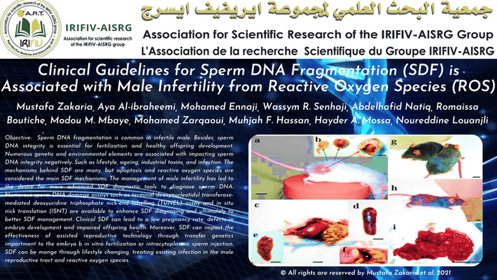Clinical Guidelines for Sperm DNA Fragmentation (SDF) is Associated with Male Infertility from Reactive Oxygen Species (ROS)

Mustafa Zakaria1 *, Aya Al-ibraheemi2 *, Mohamed Ennaji3 , Wassym R. Senhaji4 , Abdelhafid Natiq5 , Romaissa Boutiche6 , Modou M. Mbaye7 , Mohamed Zarqaoui8 , Muhjah F. Hassan9 , Hayder A. Mossa10 and Noureddine Louanjli11
ABSTRACT Sperm DNA fragmentation is common in infertile male. Besides, sperm DNA integrity is essential for fertilization and healthy offspring development. Numerous genetic and environmental elements are associated with impacting sperm DNA integrity negatively. Such as lifestyle, ageing, industrial toxins, and infection. The mechanisms behind SDF are many, but apoptosis and reactive oxygen species are considered the main SDF mechanisms. The management of male infertility has led to the desire for more advanced SDF diagnostic tools to diagnose sperm DNA. Numerous sperm DNA damage assays such as terminal deoxynucleotidyl transferase-mediated deoxyuridine triphosphate nick-end labelling (TUNEL) assay and in situ nick translation (ISNT) are available to enhance SDF diagnosing and ultimately to better SDF management. Clinical SDF can lead to a low pregnancy rate, defects in embryo development and impaired offspring health. Moreover, SDF can impact the effectiveness of assisted reproductive technology through transfer genetics impartment to the embryo b in vitro fertilization or intracytoplasmic sperm injection. SDF can be mange through lifestyle changing, treating existing infection in the male reproductive tract and reactive oxygen species.
* Correspondence: Mustafa Zakaria, Consultant at IRIFIV Fertility Center, Administrative Deputy and Writer for the Association for Scientific Research of the IRIFIV-AISRG Group, Casablanca, Morocco, Tel: 212 522397339 ; E-mail: dr.zakaria@irifiv-aisrg. com.